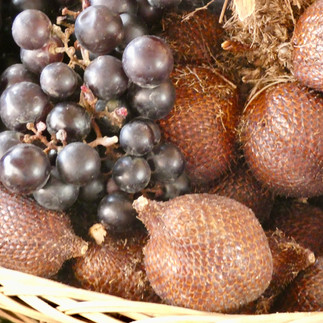Wholesome Bali
- Jan Dehn

- Apr 16, 2023
- 2 min read
Updated: Apr 27, 2025

At first sight, Bali can seem a lot like Thailand. The tourism industry is extremely well-developed, the island is warm and tropical, people are lovely, and the food is pretty good. Upon further reflection, you notice a wholesomeness which is uniquely Balinese.
Bali is benign. Kind. Traditional. Slower. There is a rich goodness here. The island is replete with volcanoes, so the soil is extremely fertile. There is more regular rainfall, so the island is ridiculously green. People seem much closer to nature than in Thailand; Bali has more than 10,000 temples and the Balinese use them to a far greater extent than in Thailand, often to make sacrifices to nature itself. This reflects a close connection between people and the environment that you only rarely encounter in modern Thailand.

Nowhere do you get a better sense of the rich fertility of this island than in the fresh markets, where the abundance of fruit and vegetables and spices is truly astonishing. You see FAR more variety in any little local fresh market in Bali than you see in the most well-stocked supermarkets in Europe, with many items completely unfamiliar to foreigners.
For example, today I visited a small fresh market with just three stalls along the road from Ubud to the Ulun Danu Beratan Temple in Central Bali. This is what I found for sale in the fruit sections of the three stalls:
· Passion fruit
· Guava
· Durian
· Snow fruit
· Mangosteen
· Tomatoes
· Mangos
· Oranges
· Soursop
· Sweetsop
· Snakeskin fruit (aka Salak)
· Rambutan
· Papaya
· Banana
· Pomelo
· Star Fruit
· Jackfruit
· Dragon fruit
· Noni
· Orange Coconut
· Green Coconut
· Cacao
· Tamarind
· Lime
· Java plum
· Ambarella
· Dukuh
· Sawo Kecik
· Pineapple
· Rose apples
· Grapes
· Malang apples
· Longan
· Watermelon
· Honeydew melon
· Tamarillo
· Lychees
· Strawberry
· Gandaria
· Chillies
· Cempedak
· Sukun
· Sawo
Obviously, there are also countless vegetables and spices for sale. All products are grown on small family holdings using traditional methods, often as part of a crop rotation with rice, the stable carbohydrate around here. Produce is brought to market in the morning, sold within hours, and consumed on the same day (since most Balinese in rural areas do not have fridges). It is possible to live a very good and healthy life in Bali!
The End




























Comments